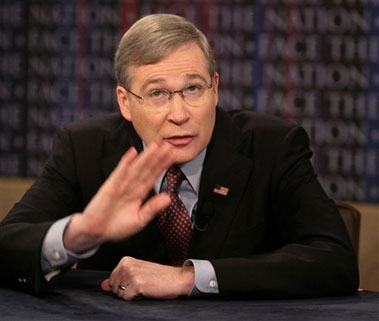Bush aide: 'We have not failed in Iraq'
(AP)Updated: 2006-12-04 08:28
 In this photo provided by CBS, National Security Adviser Stephen Hadley appears on CBS's 'Face the Nation' in Washington December 3, 2006. [AP]  |
WASHINGTON - While US President Bush acknowledges the need for major changes in Iraq, he will not use this week's Iraq Study Group report as political cover for bringing troops home, his national security adviser said Sunday.
"We have not failed in Iraq," Stephen Hadley said as he made the talk show rounds. "We will fail in Iraq if we pull out our troops before we're in a position to help the Iraqis succeed."
The White House readied for an important week in the debate over Iraq: Bush planned a meeting Monday with Abdul-Aziz al-Hakim, the Shiite leader of the largest bloc in Iraq's parliament, and awaited the recommendations Wednesday from the bipartisan commission.
Yet his administration, hoping to find a new way ahead in Iraq, found itself on the defensive from the second recent leak of an insider's memo on Iraq in a week.
The latest, first reported in Sunday's New York Times, showed that Donald H. Rumsfeld called for a "major adjustment" in US tactics on November 6 -- the day before an election that cost Republicans the Congress and Rumsfeld his job as defense secretary.
Hadley played down the memo as simply a laundry list of ideas rather than a call for a new course of action.
He said that Bush -- just before a pivotal election -- was not portraying a different sense of the war to the public than his own defense secretary was giving him in private.
The president "has said publicly what Rumsfeld said, that things are not proceeding well enough or fast enough in Iraq," Hadley said.
Democrats did not buy that.
"The Rumsfeld memo makes it quite clear that one of the greatest concerns is
the political fallout from changing course here in the United States," said Sen.
Joseph Biden, D-Del., the incoming chairman of the Senate Foreign Relations
Committee. "The bottom line is there is no one, including the former secretary,
who thought the policy the president continues to pursue makes any sense."
| 1 | 2 |  |
|
||
|
||
|
|

